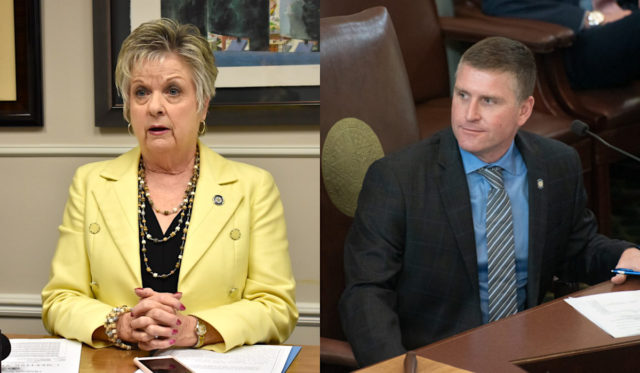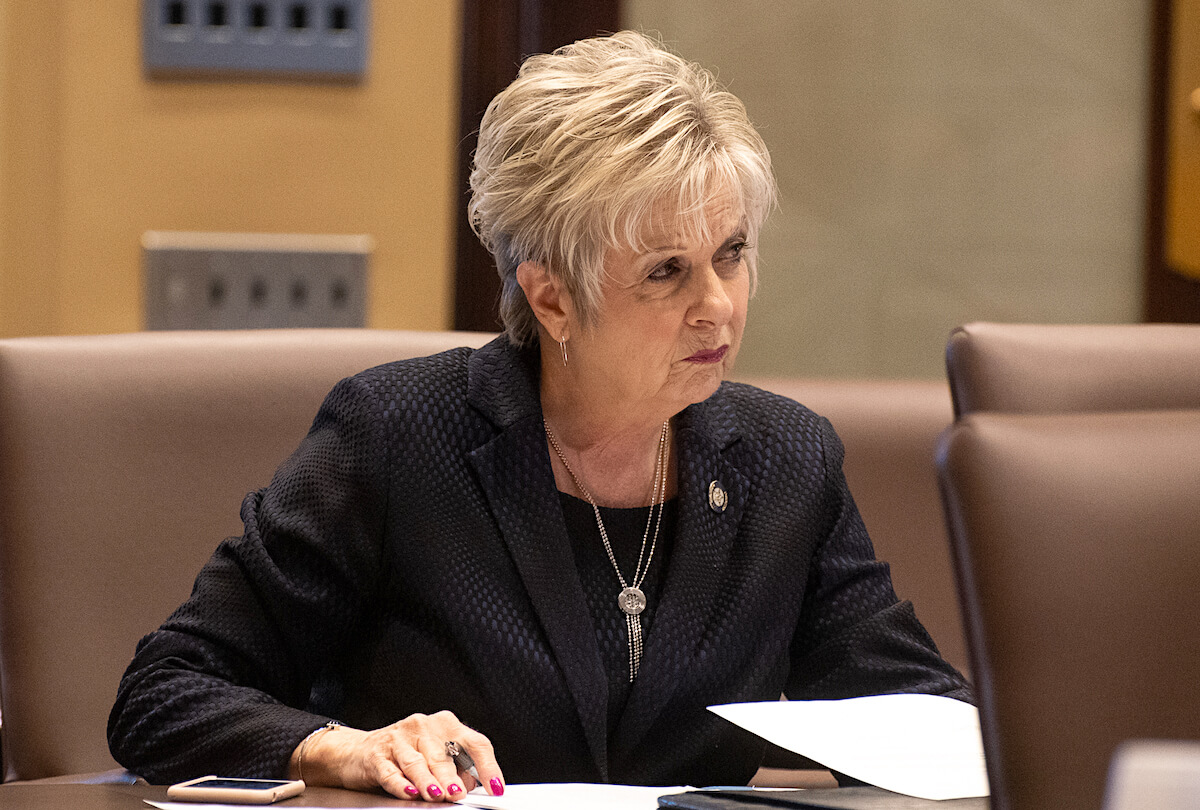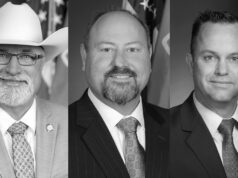
In an unusual six-minute meeting this afternoon, House Civil Judiciary Committee Chairman Chris Kannady lambasted his Senate counterpart for refusing to hear bills with broad support in the House and adjourned his meeting without hearing a single Senate bill on the agenda.
“I ran all of my bills through committee last week,” said Kannady (R-OKC). “I am also laying over every single Senate bill in committee today.”
Vice Chairman Bob Ed Culver (R-Tahlequah) slammed his gavel to conclude the meeting, which — for now — is the last scheduled House Civil Judiciary meeting ahead of Thursday’s deadline for policy bills to be heard in a committee opposite their chamber of origin.
To start Tuesday’s meeting, Kannady allowed close friend and mental health care advocate Rep. Josh West (R-Grove) to deliver a three-minute speech about a pair of bills:
- HB 2969, the Oklahoma Computer Data Privacy Act that would have required companies grossing at least $15 million in annual revenue from the sale of customer computer data to alert their customers and have them opt into said data collection; and
- HB 3899, which would allow up to 52 weeks of workers’ compensation benefits for first responders who are diagnosed with post-traumatic stress disorder related to their work.
“They’re going to die in the Senate. I never care if my bills die,” West said. “But when they die in committee without people having the intestinal fortitude to put the stinking things [up for a vote], I’ve got a problem with it.”
West co-authored HB 1602 last year in an effort to make companies that collect and sell user data obtain authorization from their customers to do so. Dozens of local and national lobbyists swarmed the State Capitol last year to oppose the bill, which was reconstituted as HB 2969 this year.
“That bill would have allowed you to have a say on your private information and whether it is sold to countries — enemies of the state — (or) to third-party vendors,” West said. “If they were holding your information and selling it, you would have had the opportunity to opt in.”
West then discussed HB 3899, which he said he and Kannady have worked on for six years in an effort to establish PTSD as a recognized condition that qualifies for workers’ compensation coverage among full-time law enforcement officers, firefighters and emergency medical technicians.
“Not a single stinking (House) member voted against that bill. If you don’t think it’s needed, then turn on the news,” said West, a Bronze Star and Purple Heart recipient who has discussed his mental health challenges as a veteran of the U.S. Army. “I’m probably a subject-matter expert in this field that all wounds are not visible.”
West thanked Kannady for the opportunity to speak at the House Civil Judiciary Committee.
“I know that you and I will continue to work on this PTSD bill for first responders because it is important to both of us,” West said. “But I say in the meantime we burn this sucker down. Stand up, and burn it down.”
Minutes later, after delivering his own soliloquy about the bills denied hearings earlier in the day by Senate Judiciary Committee Chairwoman Julie Daniels, Kannady referred to Daniels critically without using her name.
“We have to stand up for what we believe is good policy,” Kannady said. “The only thing I can figure out is that she just doesn’t care because there’s no other reason why this bill (on PTSD) is not getting heard.”
Daniels: ‘This is not a question of caring’

Earlier Tuesday morning, Daniels (R-Bartlesville) chaired an 80-minute meeting of the Senate Judiciary Committee. Although Daniels had served as chairwoman from 2019 through 2021, Senate President Pro Tempore Greg Treat (R-OKC) named Sen. Brent Howard chairman at the start of this session.
However, soon after Howard (R-Altus) voted against Treat’s controversial Education Empowerment Act (SB 1647) — and after he was the only Republican to vote against Treat’s court reform proposal in SJR 43 — Treat announced that he was reinstating Daniels as chairwoman of the Senate Judiciary Committee. Howard reverted back to being vice chairman of judiciary, and Daniels told NonDoc that she was disinclined to hear the data privacy bill and some other measures.
When Tuesday morning’s Senate Judiciary Committee meeting concluded, Daniels had granted neither HB 2969 nor HB 3899 a hearing. She called the data privacy bill “very complicated” and “much more expansive in terms of the problems I think it would create and the relationships between businesses and consumers that would be affected.”
Regarding the first-responder PTSD measure, Daniels said she believed other approaches — such as establishing wellness initiatives and improving mental health care coverage offered by employers — would be more appropriate than the workers’ compensation proposal.
“I did not believe that making this a workplace injury was the way to best ensure that they improve their mental health to the point that they may stay on their job,” Daniels said.
Later Tuesday, Daniels watched the video of West and Kannady’s remarks during the House Civil Judiciary Committee, and she responded to Kannady’s statement that “she just doesn’t care.”
“I reject the premise that the only way to ‘care’ for the mental health of first responders is to address it through the Workers’ Compensation Act,” Daniels said. “I believe there should be robust mental health benefits for our first responders, but their employers should provide the assistance needed to help them get well, help them carry on their profession and satisfy the taxpayers in these counties and towns that we are taking good care of our first responders and meeting their mental health needs.”
Daniels pointed to Section 1, Subsection G of the bill, which would allow a municipality that incurred a significant financial obligation under a PTSD-related workers’ compensation payout to transfer some or all of the payment — or subsequent insurance premium increases — to property tax rolls of the jurisdictional area. Daniels said that concept concerned her from a financial perspective.
Kannady said quibbles over small components of a bill are common among legislators and should not be used as excuses to avoid hearing a measure altogether.
“If she has issues with parts of the bill that have nothing to do with addressing the PTSD issue, I am certain that we could alleviate those problems,” Kannady said after his meeting. “However, she has never — in the time she has been chairwoman of judiciary — been willing to have a conversation about this issue, which is why I said I don’t think she cares.”
Daniels said she was having phone calls with attorneys in other states to see what they have done to improve mental health prevention and treatment resources for first responders.
“This is not a question of caring,” she said. “This is a question of the best approach to take with this very real problem.”
Asked if he might schedule another House Civil Judiciary Committee meeting to hear the 11 bills he held over prior to Thursday’s deadline, Kannady said anything is possible.
“As of now, no, I’m not planning on having another meeting,” Kannady said. “But if something changes, I’m willing to have another meeting, but that would require permission from the speaker.”
Among the bills laid over by Kannady are SB 1596, regarding health care power of attorney laws, and SB 1271, which — to some irony — involves the Dispute Resolution Act.




















